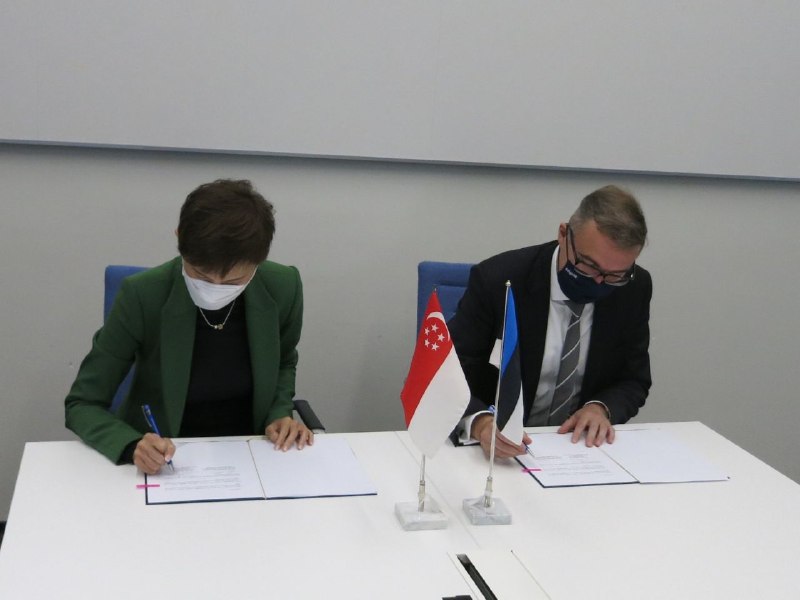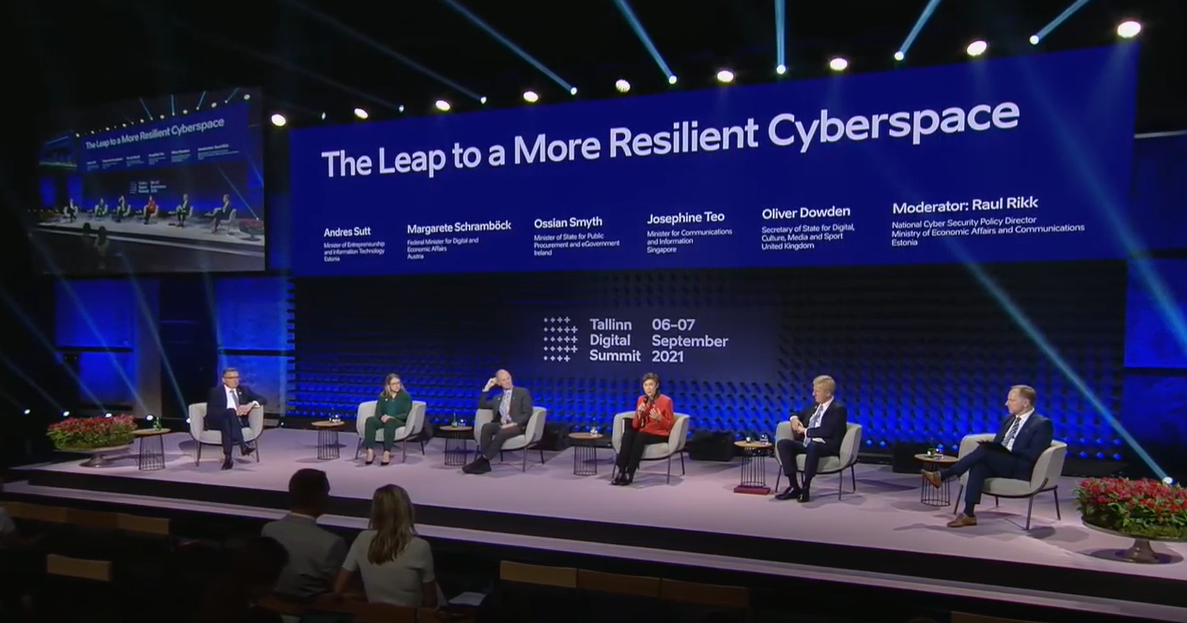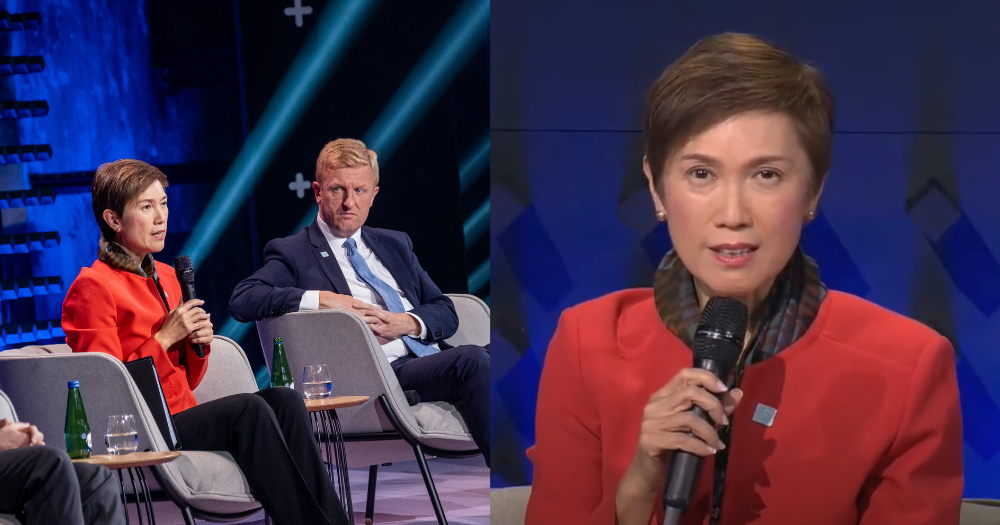Follow us on Telegram for the latest updates: https://t.me/mothershipsg
Singapore might be geographically far apart from Estonia, a country in northern Europe, but the two share some similarities, and can learn from each other, Minister for Communications and Information Josephine Teo said.
Speaking to the media on Wednesday (Sep. 8) via a virtual call from Tallinn, Estonia, Teo, who's also Minister-in-charge of Smart Nation and Cybersecurity, shared some of the key learning points that both countries can learn from each other, notably in terms of their digitalisation efforts.
She is currently in Estonia for the by-invitation-only Tallinn Digital Summit from Sep. 3 to 10.
Learning points for both Singapore and Estonia
Responding to Mothership's question on what the two countries can learn from each other, Teo pointed out that Estonia, driven by its constraint with a small population of 1.3 million, "decided they should go digital quite early."
She shared that 99 per cent of government services in Estonia are all digital, and 99 per cent of Estonia's population have a digital identity, similar to SingPass.
"So its determination, its creativity in overcoming its constraints are very worthwhile qualities that we can also learn from to emulate," Teo said.
She added "that is why we find it a very fruitful relationship with Estonia we partner with them on several areas".
As for Estonia, they are interested in Singapore's Smart Nation and digital government efforts. Teo said that the country was also keen to learn more about the tools that Singapore have in its move towards digitalisation, including Singpass and SGFindex.
Estonia is also interested to learn about Singapore's regional partnerships, including its smart connectivity initiative with China, Teo added.
Signed MoU with Estonia
Due to the shared interests of both parties, Teo signed a new Memorandum of Understanding (MoU) with Estonia’s Minister of Entrepreneurship and Information Technology Andres Sutt on Sep. 6.
Key areas of cooperation include greater market access for companies from both countries, facilitating more collaboration between startups from both sides, and supporting the digitalisation of small and medium-sized enterprises (SME).
 MOU signing with Andres Sutt. Photo by Ministry of Communications and Information.
MOU signing with Andres Sutt. Photo by Ministry of Communications and Information.
As for the significance of the MoU, Teo said that there were several areas that are "really worth working on". She shared with reporters that Estonia is interested in Asia, and sees Singapore as "potentially a gateway" and "a springboard" for their businesses.
"So between myself and my Estonian counterpart, the Minister for Economic Affairs and Communications, we discussed how the startup ecosystems, both in Singapore and Estonia can be better connected," she said.
Teo also shared that Estonia has produced a number of unicorns despite its small population size.
"The two startup ecosystems can potentially be linked up, understand the markets better in each part of the world, each other's part of the world, and potentially find innovative ways, or innovative products and services to bring to market," she shared.
Inclusion not neglected
Teo was also responding to a question on whether is Singapore aiming to be like Estonia in the future, with 99 per cent of its government services going digital.
She shared that Singapore always aims higher but is "very mindful that as we go about digital development, inclusion is not neglected".
It is on that basis, she shared, that Singapore started the SMEs Go Digital and Senior Go Digital Programme.
"If everyone is to benefit from digital developments, then they need to acquire the skills and confidence to use digital tools," Teo said.
She further said that Singapore will progress at the pace that allows everyone to benefit from greater availability of digital services, whilst at the same time, help citizens to manage better with the digital tools.
Three key areas of discussion
During the summit, Teo discussed three areas of concern at a panel discussion on Sep. 7, which was themed "The Leap to a More Resilient Cyberspace".
 Screengrab from Tallinn Digital Summit/YouTube
Screengrab from Tallinn Digital Summit/YouTube
Singapore adopting an "assume breach" mindset of cybersecurity
In the panel discussion, all panellists agreed that cyber threats are transnational, and can seriously threaten critical infrastructure, as well as affect vital government services.
Teo described the problem of cybersecurity as being a "wicked" problem that cannot be "solved once and for all".
Hence, Singapore is changing its cybersecurity posture from emphasising preventive measures to adopting an “assume breach” mindset, which assumes systems have been breached or compromised.
This is so that there would be constant vigilance and monitoring to identify the breaches, she explained.
Teo added that in the actual event of a breach, it would be critical for governments to have already put in place response mechanisms for swift recovery.
She also said that clear and timely communications would be essential to maintain public trust.
Adding on to that, she told reporters that timeliness and completeness are important qualities that they will "always try to achieve" in public communication of a security breach.
"I think as a general rule of thumb, in terms of public communication, we want to be able to tell the public what has happened in as much detail as possible" she said.
Raising public education on cyber hygiene
In addition, Teo agreed with the panellists in highlighting the importance of raising public education on cyber hygiene and preventive measures.
She added that Singapore views cybersecurity as a shared responsibility and described the strategies the country had been taking at various levels to raise cyber resilience.
At the enterprise level, she cited the practicality of cybersecurity toolkits and the SG Cyber Safe Trustmark to help enterprises be recognised for their good cyber practices.
On the other hand, at the national level, Teo shared Singapore’s sector-specific responses, which enable sectors themselves to actively play a role in designing cybersecurity measures that would be tailored to their needs.
Internationally, Teo agreed that better international cooperation is needed to identify and take action against cyberattacks.
An example that Teo shared was Singapore’s contributions as the chair of the Open-Ended Working Group over the next five years, which she said will seek to strengthen rules-based international order in cyberspace.
She also highlighted Singapore’s efforts in setting up the Asean-Singapore Cybersecurity Centre of Excellence to build capacity and share information.
No fixed value for cybersecurity expenditure
Teo also touched on the expenditure and investment in cybersecurity. She said that there was no "right" answer or any fixed value for cybersecurity expenditure.
Instead, she advocated for leaders of organisations to understand the risk profile of their organisations and muster the appropriate amount of resources to protect their digital assets.
According to Teo, in Singapore, organisations are encouraged to do their risk assessment and apportion their budgets accordingly, rather than simply doing the bare minimum to meet compliance requirements.
Follow and listen to our podcast here
Top images via Ministry of Communications and Information and Tallinn Digital Summit/YouTube
If you like what you read, follow us on Facebook, Instagram, Twitter and Telegram to get the latest updates.
